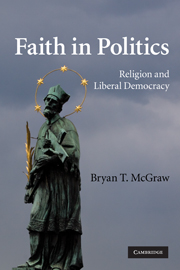Book contents
- Frontmatter
- Contents
- Acknowledgements
- Introduction
- 1 Europe's religious parties and the liberal consensus
- 2 The argument for deliberative restraint
- 3 The problem with secular reasons
- 4 Public reason and religious conflict
- 5 Religion and the problem of political autonomy
- 6 Making the most of conflict: religion and political toleration
- Conclusion: toward a better sort of liberal democracy
- Bibliography
- Index
6 - Making the most of conflict: religion and political toleration
Published online by Cambridge University Press: 05 June 2012
- Frontmatter
- Contents
- Acknowledgements
- Introduction
- 1 Europe's religious parties and the liberal consensus
- 2 The argument for deliberative restraint
- 3 The problem with secular reasons
- 4 Public reason and religious conflict
- 5 Religion and the problem of political autonomy
- 6 Making the most of conflict: religion and political toleration
- Conclusion: toward a better sort of liberal democracy
- Bibliography
- Index
Summary
Suppose that it is true, as I have argued in the previous chapters, that religious believers in pluralist liberal democratic societies may not only consult their religious views when deliberating about or taking political action, but that they may do so independently of other, putatively public views, all without endangering the possibility of political legitimacy. Suppose further, if just to humor my argument, that this political mobilization of religion, ensconced within institutions designed to buttress them against modernity's pressures, is quite compatible with and sometimes even productive of political autonomy. Even if there are good reasons for thinking that religious beliefs do not threaten legitimacy or the capacity for autonomy, many liberal theorists rightly worry that those beliefs could and will have oppressive political consequences, in particular undermining liberalism's traditional protections for pluralism and diversity. In short, the worry goes, religion can still pose a significant problem for a regime of political toleration.
You can hardly peruse a book on religion and politics – never mind liberal politics – without running into plenty of ominous rehearsals of how religion embodies, breeds, and institutionalizes intolerance. Distinctly intolerant religious views (to understate it pretty strongly) combined with political ambition to drive the destructive religious wars in Europe in the sixteenth and seventeenth centuries. When Islamic terrorists behead “infidels” in a bid to secure a theocratic umma, it is no slur to think them intolerant (and their intolerance deeply abhorrent).
- Type
- Chapter
- Information
- Faith in PoliticsReligion and Liberal Democracy, pp. 218 - 259Publisher: Cambridge University PressPrint publication year: 2010

